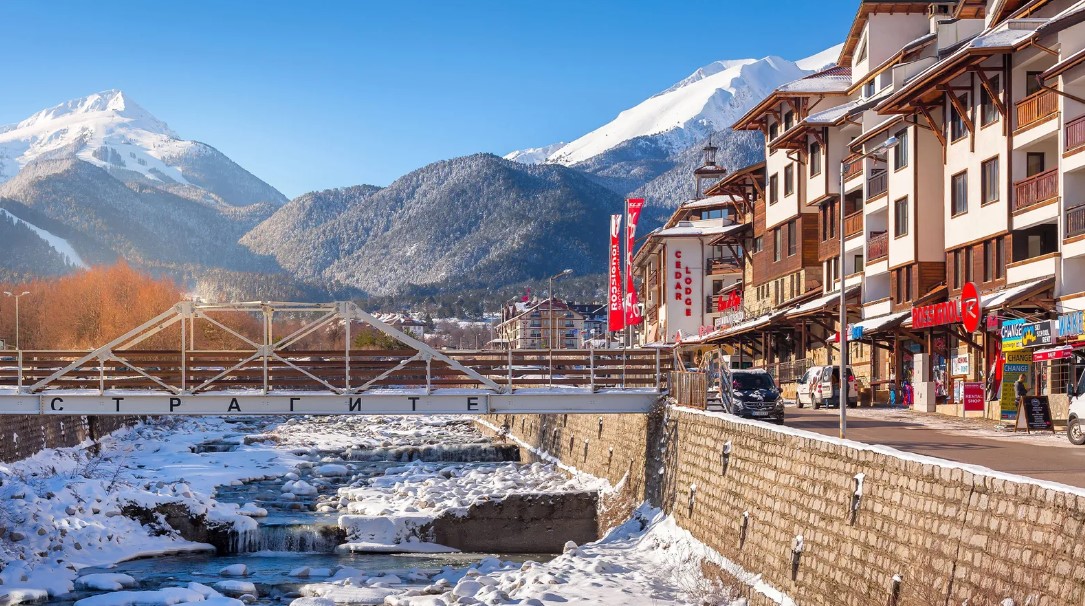In recent years, the picturesque town of Bansko, Bulgaria, which is located at the foot of the Pirin Mountains, has quietly emerged as one of the world’s newest remote working hubs.
When you visit Bansko for the first time, you can have the impression that you’ve been taken back in time to a more innocent era. There are storks nesting on telegraph poles, groups of head-scarfed grandparents gossiping beneath apple trees on street corners, and Roma people whipping their steeds while riding in horse-drawn carts along the road. The marble peaks of south-west Bulgaria’s Pirin Mountains march over pine-clad slopes, looming above the town and its ski resort like the outstretched wings of a crouching dragon. These peaks may be seen from above the red rooftops of the buildings in the town.
However, on a sunny day earlier this summer, over 700 business owners and freelancers jammed the cafes of this rural town in the south-west of Bulgaria, which has a population of 10,000 people. Languages ranging from Hebrew to Japanese could be heard filling the air. In one of the buildings in the town square, a young German man spoke to a crowded auditorium about the benefits of working a four-hour work week. Meanwhile, in the nearby park, hundreds of digital nomads listened to their colleagues talk on a variety of subjects, including artificial intelligence, networking methods, and health tips. An enormous crowd of people who were attending the event danced and drank into the night at an outdoor bar in the evening.
Since its inception three years ago, the Bansko Nomad Fest has blossomed from a modest get-together into the world’s most well-attended annual celebration of the digital nomad lifestyle. This week-long jamboree is being organized by a small army of volunteers, and it will feature hundreds of live-streamed speeches, group dinners, and activities such as bonfire parties and rafting.
During the festival, the rapidly expanding population of digital nomads in Bansko is at its most obvious. However, this only tells part of the tale. The town has been described as the “most consistently growing remote work hub” in the globe over the course of the past five years by the website resource Nomad List. It has expanded by 231% since 2018, which is greater than Warsaw, Madrid, and Tallinn, which is a tech media darling city.
This seems to be a bit of an anomaly: polls have shown that digital nomads like coastal towns (like Lisbon and Barcelona), islands and beach destinations (like Madeira, the Canaries, and Bali), and beach destinations in general. Why then are an increasing number of people traveling to a relatively undeveloped mountain resort in the interior of Bulgaria?
Matthias Zeitler, an entrepreneur from Germany, came to Bansko in 2016 while looking into potential locations for a coworking space he wanted to open. This is where the narrative begins. The area’s natural beauty as well as its practical perks, such as quick Wi-Fi, low living costs, and low taxes – which, at just 10% personal and corporate, are among Europe’s lowest, attracted Zeitler to the location.
“We came here in the summer with a few friends, rented a house and decided this could be a good place for us to have a base,” according to Zeitler. Coworking Bansko, the first coworking space in the community, was founded by him in 2016, and it experienced rapid growth. The following year, in 2020, he launched Bansko Nomad Fest, and by 2023, all 729 tickets for the event had been sold.
More than 300 people now call Bansko their home each and every month, and the town’s population more than doubles during the winter months when skiing is popular. The fact that you can spend the morning skiing and be back at work for lunch in Bansko is undeniably appealing, but the town also excels in a number of other categories as well. When the snow melts, the forests, turquoise lakes, and steep peaks of the neighboring Pirin National Park, which is included on the UNESCO World Heritage List, offer a plethora of activities for outdoor activity, including hiking, cycling, and horseback riding.
“What really sets Bansko apart is how laid-back, friendly, and welcoming the community is here,” said Camille Poire, a French marketing manager who has been visiting here with her boyfriend since 2018. Poire has been coming here with her girlfriend since 2018. “We’re reminded of this every time we come back from our travels and plug back into the Bansko social life.”
There is a mind-boggling variety of social events to choose from, such as classes in salsa dancing, meals, board games, sports, trips to hot springs, quizzes, and barbecues. Many are available to anyone, regardless of whether or not they are digital nomads. “When they first arrive, many people say things like, ‘Oh, it’s a little bit quiet. “I’m not really sure there’s anything going on for me,” Becky Bottjer, who manages the coworking space Altspace, said. “I’m not really sure there’s anything going on for me.” Within a couple of days, they’ll tell you, ‘I can’t go out anymore. I had to get away from here for a while.'”
According to Deputy Mayor Sashka Vuchkova, “the people of Bansko like this international atmosphere.” She went on to add that the increasing number of foreign and mixed families in the town – including Ukrainian refugees – is generating a cosmopolitan climate in schools. “The people of Bansko like this international atmosphere,” she stated. “In one of our classes, there are students who are citizens of eight different nations. They are all able to communicate in Bulgarian, albeit with varying degrees of fluency; nonetheless, given their young age, it is expected that they will improve.
Some long-term digital nomads are establishing connections with the communities in which they reside. One such individual is the Dutch-Colombian entrepreneur Jose Fiallo, who operates BanskoLab, a cafe and cultural center in which children can participate in educational seminars and learn a new language.
Many of the “crypto bros,” life coaches, and wellness gurus that are frequently made fun of in relation to the digital nomad trend may be found living and working in Bansko’s expat population. On the other hand, there are programmers, videographers, stand-up comedians, designers, English instructors, artists, translators, and even scientists who come from dozens of different countries.
The expansion of the environment can be attributed to the growing number of nomads. There are presently nine coworking spaces in the city, all of which are run by different organizations. These range from the vibrant and socially focused Coworking Bansko to the industrial office facilities run by Nestwork and the summer camp vibe of Four Leaf CloverCoLive.
The newest coworking space in Bansko is called Nestwork, and it just recently launched a massive second location. Bulgarian IT employees Dimitar Durchov and Dimitar Vichev returned from working abroad to launch the firm after recognizing a demand for a sophisticated, corporate-style coworking space. They wanted to create “a welcoming place where you feel like home, but not home enough that you’re distracted from work,” as Vichev described it. They explained that Bansko is not only appealing to digital nomads from other countries; Bulgarians are also taking advantage of the situation by moving there from Sofia or even moving there from other countries.
Vladimir Dimitrov, who was born in Bulgaria but had been living in London with his family since he was 12 and thought he’d never live in Bulgaria again, went to Bansko five years ago after realizing he could mix working online with snowboarding and mountain biking. “I’d been living in London with my family since I was 12 and thought I’d never live in Bulgaria again,” Dimitrov said. “On top of that, the cost of living was much lower, so it was a no-brainer.”
The situation with Dimitrov is illustrative of a growing trend: some nomads find Bansko’s laid-back way of life so appealing that they decide to make the town their permanent home. A one-bedroom apartment costs between €40,000 and €70,000, which is still within most people’s financial range, despite the fact that real estate is relatively inexpensive in comparison to Western norms. (In Bulgaria, a residency permit is required in order to purchase land, but anyone is free to own an apartment.) The monthly rent is also rather affordable, ranging from €300 to €500 for apartments with one bedroom.
According to Eli Tsoneva, a local estate agent at Plus Property, nomads make up approximately five percent of Bansko’s sales, while other types of foreign investors make up the majority of the city’s buyers. “Thirty percent of our agency’s buyers are Bulgarian,” stated the representative.
As for Zeitler, he is working toward the realization of his own dream, which is to convert a massive hotel that was built during the Communist era but has been abandoned and is located in the surrounding woodland into the ideal communal living area for digital nomads. The Coliving Semkovo co-operative will be “a community for the community” and will feature 200 residential flats, a lobby with multiple levels, a swimming pool, an auditorium, and panoramic views.
Although Coliving Semkovo will be an adults-only community, Bottjer has already observed a growing number of “digital nomad families” relocating to the Bansko area. She said, “I think that’s going to be the next big thing, especially with the cost of living going up in places like the UK and the US,” adding that once people have experienced life in Bansko, they tend to return. “I think that’s going to be the next big thing, especially with the cost of living going up in places like the UK and the US,” she said.
“There’s a kind of magic here,” she said. “There’s a kind of magic here.” “I don’t know what it is, but people seem to keep coming back.”




